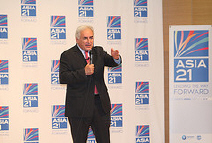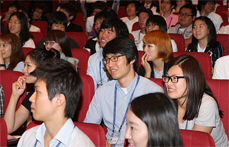
Typical street scene in Santa Ana, El Salvador. (Photo: iStock)
IMF Survey: IMF Chief Works to Transform Fund's Image in Asia
July 12, 2010
- Strauss-Kahn broaches dynamism of Asia, tackles bad memories of the IMF
- Emphasizes importance of diversity in the Fund
- IMF chief reveals reasons for choice of economics as career
Striding across the stage, speaking freely without his notes, while grasping a microphone in his hands, the head of the IMF was clearly enjoying himself as he held sway over an uncharacteristically young audience during a town hall which drew Korean students from all over the country.

More than 200 students attended a townhall meeting with IMF’s Strauss-Kahn during Asia 21 Conference in Daejeon, Korea (photo Stephen Jaffe/IMF)
ASIA 21 CONFERENCE
Speaking to more than 200 high school and university students during the Asia 21 Conference organized in the Korean city of Daejeon, Dominique Strauss-Kahn addressed head on the thorny subject of the Asian crisis, described the importance to the 187-member Fund of its Asian members, and revealed his human side with an explanation of his reasons for choosing economics as a career.
Strauss-Kahn acknowledged that in the process of aiding governments during the Asian crisis over a decade ago, bad memories of the IMF had been created by the large number of conditions attached to the IMF loans, but he said the dynamic region—which has turned into an economic powerhouse--now needed to look to the future.
“I understand they [Asian countries] could be angry at the IMF, that is because a lot of things that we know now, we did not know at that time,” Strauss-Kahn stated. “Now we need to look forward and to see how Asian countries and the IMF could work together for the future.”
Asia got through the recent global financial crisis better than many other parts of the world, and Asian economists at the conference credited reforms from the Asian crisis period as helping to make the region more resilient.
Reflecting diversity within the Fund
In response to a question from a university student, who characterized the Fund as a “bad guy” because of the organization’s dominant western culture, Strauss-Kahn said it was important to represent the diversity of cultures within the global economy, so the IMF could better tailor advice to its members.
“You cannot implement difficult economic programs in countries if you don’t have some knowledge of the history, the political situation, of the country. If you just come from outside with no knowledge, then there is a big risk of failure,” he said.
Strauss-Kahn acknowledged that the IMF might formerly have been dominated by industrialized countries, but he noted that the Fund was tackling the issues of governance and representation to reflect the growing importance of the Asian region to the global economy. He pointed to the fact that during the recent crisis, countries like China, India, and Japan had made significant contributions to boosting the resources of the Fund.
“I want Asian countries to see the IMF as a second home. I want Asian countries to see the IMF as their institution,” he said.
Encyclopedic knowledge
One of the most unlikely subjects to be raised was from a foreign student from Uzbekistan, who asked the Managing Director about the prospects for his home country. With a mischievous smile on his face, the IMF head said “I didn’t expect a question on Uzbekistan in Daejeon, Korea,” and then proceeded to impress the audience with his encyclopedic knowledge of the central Asian country’s economic situation, recalling his meeting with the country’s president whom he identified by name, and spoke about access to water as one of the most pressing problems for this land-locked country.
The former economics and finance minister for France also provoked widespread laughter in response to a question from a math student, explaining in jest that he had only chosen to study economics by default.
“Probably I wasn’t good enough in mathematics to study mathematics. My father was a lawyer, so I didn’t want to be a lawyer. I could have studied medicine but I was very afraid of blood … I was not an artist so I was totally unable to study literature or painting, so finally I checked the box ‘economics,’ ” he joked.
The former professor of economics at the Institut d'Etudes Politiques de Paris explained that he had chosen his field of study because he wanted to master his future and also to be able to impact the environment in which he lived.

Students listen to Strauss-Kahn during Asia 21 Conference in Daejeon, Korea (photo Stephen Jaffe/IMF)
Winning over the crowd
After an hour spent with his audience, on exiting the auditorium, the IMF chief was surrounded by a large crowd of students and for a few minutes he was delayed as they pulled out their cell phones and cameras to have their photo taken with the top official.
The exercise in outreach appeared to have convinced at least some of the students, like Song In Cho who left the townhall meeting saying his impression of the IMF had been transformed.
“I thought the IMF was, like, giving us money and kind of making us pay back the loan harshly, but after hearing Strauss-Kahn I have a good impression that the IMF is not simply loaning the money but also restructuring the financial system of the countries that are in trouble.”
Cho said he had expected Strauss-Kahn to be a “strict man,” but discovered him to be a “friendly guy”.
But other students still thought there was room for improvement. Among them, Yong Jin Kim. “Even though he [Strauss-Kahn] is visiting more countries, like Korea, than in the past, I think it is still too little. So I want him to visit more countries in Asia and try to learn more about their culture so that in the future, when he chooses a policy to help Asia, he will be more aware of the situation so that it will be more beneficial,” he said.


